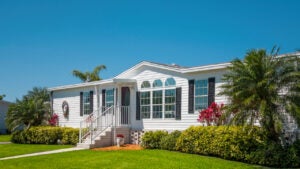How to finance a mobile or manufactured home




Key takeaways
- Mobile homes, also known as manufactured homes, can be a cost-effective alternative to buying a traditional home.
- Due to their lower cost and rapid depreciation, most traditional mortgage lenders don’t offer mobile home financing.
- FHA Title I and Title II loans, Freddie Mac loans, Fannie Mae loans and personal loans are some ways you can finance a mobile or manufactured home.
With the median price of traditional homes exceeding $416,900 in the U.S., mobile homes, also called manufactured homes, can be more cost-effective while offering more flexibility. The average manufactured double-wide home costs approximately $145,200.
That said, it may take more legwork to find a lender to help you finance the purchase of a mobile or manufactured home than a traditional home. That’s because most mortgage lenders don’t offer financing for these types of properties due to the lower sales price and high rate of depreciation. Still, there are some options available.
Mobile home financing options
Since traditional mortgages may not be a viable option for financing mobile homes, consider alternative types of loans. Carefully weigh the pros and cons of each to find the solution that best meets your needs.
FHA loans
The Department of Housing and Urban Development (HUD) offers mobile home loans through the Federal Housing Administration (FHA) loan program. This includes Title I and Title II loans.
Title I loans
A Title I manufactured home loan can be used in several ways, including to finance the purchase of a new or used manufactured home, refinance a manufactured home purchase, to buy the developed lot where you will locate this type of home and for a combination purchase of both the lot and the home itself. These funds can also be used to alter, repair or improve a manufactured home.
Lenders can offer Title I mobile home loans even if the buyer doesn’t own or isn’t planning to purchase the land on which the manufactured home will stand. These homes will typically be placed in a manufactured home community or mobile home park. If the borrower doesn’t own — or isn’t buying — the land, they must provide a signed lease for a mobile home plot with an initial term of at least three years to qualify for a Title I loan.
The amount you can borrow with a Title I loan depends on the width of the home and whether you plan to purchase a lot as well:
| Purchase type | Maximum loan amount |
|---|---|
| Single-wide home | $105,532 |
| Single-wide home with lot | $148,909 |
| Multi-width home | $193,719 |
| Multi-width home with lot | $237,096 |
Title II loans
This loan program insures loans that borrowers can use to finance a qualifying manufactured home and lot. For example, you can only use a Title II loan if you plan to live in the manufactured home as your primary residence.
Other requirements for the home include:
- Have a minimum floor area of 400 square feet
- Be constructed after June 15, 1976
- Be classified as real estate, but not necessarily for state tax purposes
- Be built and remain on a permanent chassis
- The loan must cover the home and the land on which it stands
Title II loans cannot be used for manufactured homes on leased land in manufactured home communities or mobile home parks. Down payments on a Title II loan can be as low as 3.5 percent, and terms can last up to 30 years.
Fannie Mae
Some lenders offer mortgages backed by Fannie Mae through the Manufactured Housing (MH) Advantage program. The loans come with 30-year financing and down payments as low as 3 percent. As an added benefit, interest rates on MH Advantage mortgages tend to be lower than those of most traditional loans for manufactured homes.
To qualify, you must satisfy several eligibility criteria, including installing a home with a driveway and a sidewalk that connects the driveway, carport or detached garage. The home must also meet certain construction, architectural design and energy efficiency standards similar to those of site-built homes.
Freddie Mac
You may be able to obtain conventional financing for a manufactured home through the Freddie Mac Home Possible mortgage program. Down payments begin at just 3 percent, and in some cases, you can use gifted or grant money to help cover the upfront costs.
Freddie Mac also offers manufactured home financing through their CHOICEHome Mortgage program. To qualify, homes must meet the same requirements as site-built homes and meet certain eligibility factors.
VA loans
Service members with eligible service histories may qualify for a loan backed by the U.S. Department of Veterans Affairs (VA). VA loans are intended to help military members become homeowners, and can be used to buy a manufactured or modular home and put it on land you already own, buy both the home and land simultaneously or refinance a home you plan to transport to land you own.
Lenders can offer up to 100 percent financing on manufactured home loans, though you’ll have to pay a one-time funding fee, which can be between 1.25 and 3.3 percent of the purchase price, depending on the size of your down payment and whether you’ve borrowed a VA loan before. You’ll need an affidavit of affixture, which proves the property is attached to land you own and meets certain local and VA requirements.
Chattel loans
A chattel loan is a specialized type of personal property loan that can be used to purchase a mobile home. These loans are designed for financing expensive vehicles, such as planes, boats, mobile homes or farm equipment, where the property serves as collateral for the loan.
Some lenders offer chattel loans for manufactured home purchases that are insured by the FHA, the VA or the Rural Housing Service (RHS) through the U.S. Department of Agriculture. Additionally, the closing process for chattel loans is usually faster and less restrictive than what you would experience with a traditional mortgage.
But chattel loans have disadvantages to be aware of. They typically have higher interest rates than traditional mortgages. Chattel loans also have shorter terms, which means their monthly payments will likely be higher than a conventional mortgage.
Personal loans
Mobile homes are significantly cheaper than traditional homes, so you may be able to finance your purchase with a personal loan. Because personal loans are flexible, you can use them for almost any purpose — including buying a mobile home.
However, personal loan interest rates tend to be higher than secured loans, such as mortgages or auto loans. The trade-off is that you don’t have to provide any collateral — which means you won’t lose your home if you default on a personal loan — and the application process tends to be shorter and involves less paperwork.
Another important advantage of personal loans over mobile home mortgages is that they’re typically inexpensive or free to originate, says Steve Sexton, CEO of Sexton Advisory Group. “There’s no costly title, escrow or appraisal fees. And the lender has zero interest in or control over your home, because the loan is not secured.”
Personal loan lenders usually offer maximum loans of $25,000 to $50,000, though some lenders will let you borrow $100,000 or more. Your credit will need to be in good shape to qualify, and excellent credit personal loan rates can start around 6.6 percent.
How to get mobile home financing
If you’re wondering how to finance a mobile home, there are a few steps you should follow first.
1. Check your credit reports
When you apply for any type of financing, a lender will consider your credit as part of your loan application. Clean credit histories and solid credit scores make it easier to secure loans with lower rates and better terms. Your bank or credit card issuer may offer free access to your credit score, or you can buy it via a third party.
If you find mistakes when you check your credit reports, you can dispute them with the appropriate credit bureau — Experian, TransUnion or Equifax. The bureau will have up to 30 days to respond to you. You can request free copies of your credit reports at AnnualCreditReport.com.
2. Decide whether you’re buying land in addition to the mobile home
When you’re financing a mobile home, the stability of the asset being financed is important, Sexton says. If you own the land and your mobile home has had the axle and wheels removed, it’s less likely that you’ll pick up and move. This may make more lending institutions open to financing a mobile home.
3. Figure out the specifics of the home that you want to purchase
The type of home you’re considering will affect the loans you may be eligible to receive. For example, if you want to buy a double-wide manufactured home that costs $200,000 or more, you won’t be eligible for an FHA loan. Older mobile homes may not qualify for certain types of financing at all.
4. Compare financing options
Choose the type of loan you’ll use and compare different lenders’ offerings. Mobile home interest rates and fees can vary widely by lender, so take the time to shop around. Try to find a loan that has few fees and low rates so you can minimize your borrowing costs.
5. Submit your loan application
You’ll want to ensure that your application is as complete and transparent as possible. In addition, many lenders require a down payment, so be prepared to make one when you complete your application.
Current interest rates
As with any loan, mobile home interest rates and manufactured home loan rates will vary based on several factors. Your credit score, down payment amount, type of home and whether you’re buying the land will affect the amount you pay. With this information, you can use a loan calculator to estimate your loan costs.
To qualify for low mobile home interest rates, make sure your credit score is at least 700. You’ll need a score of 750 or higher and a low percentage of debt relative to your income to qualify for the best rates available. The average rates presented are accurate as of June 17, 2025.
| Type of loan | Average rates | Typical minimum credit score | Typical terms |
|---|---|---|---|
| FHA | 6.92% | 500 | Up to 30 years |
| Fannie Mae | Varies | 620 | Up to 30 years |
| Freddie Mac | Varies | 680 | Up to 30 years |
| Chattel | Starting at 5.99% | 575 | Up to 20 years |
| Personal | 12.65% | 600 | Up to 7 years |
Mobile vs. modular vs. manufactured homes
You’ll often hear the terms mobile, manufactured and modular used interchangeably when discussing these similar types of homes. While they are related, there are some important differences between these homes.
A mobile home is built at a factory before it’s brought to a property for setup. It may or may not use metal tie-downs in place of a traditional foundation. However, this explanation can also apply to manufactured homes.
Like mobile homes, manufactured homes are built in a factory. They can be set up at their permanent location on blocks, metal piers or a permanent foundation. Unlike mobile homes, manufactured homes are not intended to be moved once they’re set up. They are usually more expensive than mobile homes, with an average sale price of $120,900 in January 2025, according to the U.S. Census Bureau.
Similar to mobile and manufactured homes, modular homes are built in a factory and shipped to the land where they will be set up. However, modular homes are more similar to traditional homes. They often include crawlspaces and basements and use a traditional foundation. They can cost between $160,000 and $320,000, according to Angi.
Before you shop, understand the differences between mobile, modular and manufactured homes, so you can choose the option that makes the most sense for you.
Factors to consider when buying a mobile home
Now that you know how to buy a mobile home or manufactured home, you’ll want to consider a few factors to make sure you select the best option, including location, size and age.
Location
Before you think about anything else, figure out where you will install your mobile home. The location you choose will have a big impact on the rest of the process.
“Purchasing a mobile home and finding the right location is just like buying a home,” Sexton says. “A good neighborhood is important.”
You can choose to install the home on a piece of land you already own, buy the land where your mobile home will be located or rent a plot of land in a mobile home community. If you choose to buy land, consider zoning regulations and necessary utility hookups.
Size
Mobile homes and manufactured homes come in a variety of sizes. Larger homes are more expensive and require larger lots. As a result, you may need to borrow more if you want a larger home.
Mobile homes are usually classified by their width. Both classifications are usually about 70 feet long. The classifications you’ll typically see are:
- Single-wide homes or single units: Under 15 feet wide
- Double-wide homes or double units: About 30 feet wide
“Many towns don’t allow single-wide mobile homes in their town or city limits,” Sexton says. “Make sure you research the rules that might apply to your situation.”
Age
Unlike traditional real estate, mobile and manufactured homes tend to lose value over time. That means you can get a discount if you buy a used mobile home. The trade-off is that used mobile homes will often show signs of age, unless they’ve been well-maintained.
Some locations won’t allow the placement of homes produced before a specific date, which limits your options. Purchasing an older mobile home may require expert insight to assess its condition.
Long-term costs
When you purchase a mobile or manufactured home, one of the expenses to consider is the cost of mobile home insurance. Similar to standard homeowners insurance, this type of policy offers you protection if your home is damaged or requires repairs.
Often, mobile home policies cover both the dwelling itself and your personal belongings, if they’re damaged or stolen. You may also obtain policies that include liability coverage, which protects you if someone is injured on your property and you are held liable.
Standard mobile home insurance typically doesn’t include coverage for hurricanes, earthquakes and flood events, and may require an add-on for this protection. And, like traditional homes, the cost of mobile home insurance policies varies based on your coverage level.
Bottom line
Mobile and manufactured homes can be much more affordable than a traditional site-built home — but they can be trickier to finance. Since you typically can’t use a conventional mortgage to buy a mobile home, you should consider options like FHA loans, VA loans and personal loans.
You’ll also want to ensure the home isn’t too old to qualify, and that you have a suitable location.
Frequently asked questions
Why we ask for feedback Your feedback helps us improve our content and services. It takes less than a minute to complete.
Your responses are anonymous and will only be used for improving our website.
You may also like

How to get a home improvement loan in 6 simple steps

How to finance the cost of a home addition: 2025 estimates


